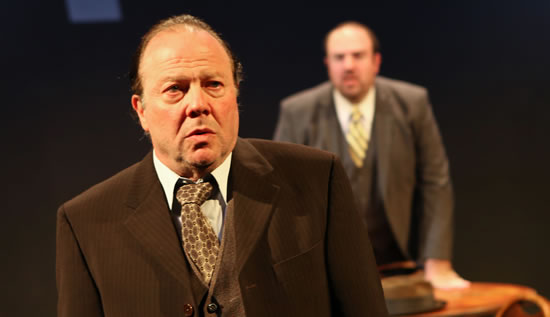Attention Must Be Paid! “Death of a Salesman” Breaks New Ground
By Beck Lee

Avi Hoffman
When New Yiddish Rep accomplished the seemingly unthinkable and made sense out of Samuel Beckett’s famously cryptic masterpiece “Waiting for Godot” by performing it in Yiddish, people asked the company’s artistic director, David Mandelbaum, how do you top this? Well the answer is now on stage in a breathtakingly well-acted production of “Death of a Salesman” at the Castillo Theatre, which is where “Godot” played two seasons ago in 2013.
Why does the play work so well in Yiddish? Though he scrupulously deflected questions about the Jewishness of the Loman family and certainly didn’t attach any specific ethnic markers to his characters, keeping them “universally” American, Arthur Miller’s own background as a Brooklyn Jew would have likely informed his approach to the play. Perhaps Miller rightly believed that framing the family as American rather than Jewish would make the play more relatable to general audiences.
At the same time, since this play about the limitations of pursuing the American dream can easily be recast as a case-study of the hazards of assimilation in the fiercely competitive culture we all know, it doesn’t seem far-fetched at all to give the characters a more precise ethnic and cultural cast. After all the syntax and speech patterns of the Lomans are not New England WASP.
This miraculous production, featuring Avi Hoffman as Willy Loman, is not the first time the play was performed in Yiddish. It is, however the first time a Yiddish production is being geared to a non-Yiddish-speaking audience. If you don’t speak or read yiddish, attention still must be paid!
Under the flawless direction of the internationally acclaimed director Moshe Yassur, “Death of a Salesman” in Yiddish uses the translation created by the celebrated Yiddish star Joseph Buloff soon after “Salesman” opened on Broadway in 1949. The unauthorized production opened in Argentina during the play’s Broadway run. Quite surprisingly, given Miller’s tight controls on his plays, Buloff was granted wide staging rights by Miller.
While Miller never discussed the implicit “rightness” of the Yiddish production, it is unclear if he granted Buloff permission to stage his version (it also traveled to Israel) because he thought it would have limited impact or precisely because he relished the fact that the production spoke a truth that he, as an American Jewish writer after World War II, was not fully at liberty to speak.
When “Toyt fun a Seylsman” played before a predominantly Yiddish-speaking audience at the Parkway Theatre in Brooklyn (the limited run in 1951 occurred just four months after the Broadway production closed), George Ross, writing in Commentary, marveled that Yiddish must be the original language of the play and that Miller secretly translated it into English.
So you be the judge! Is this play best served by the Yiddish language -- which is still deeply engrained in our popular American cultural psyche despite the fact that it is hardly spoken or read anymore? We think it is. #
“Death of a Salesman” at Castillo runs through November 22. For tickets visit www.castillo.org
